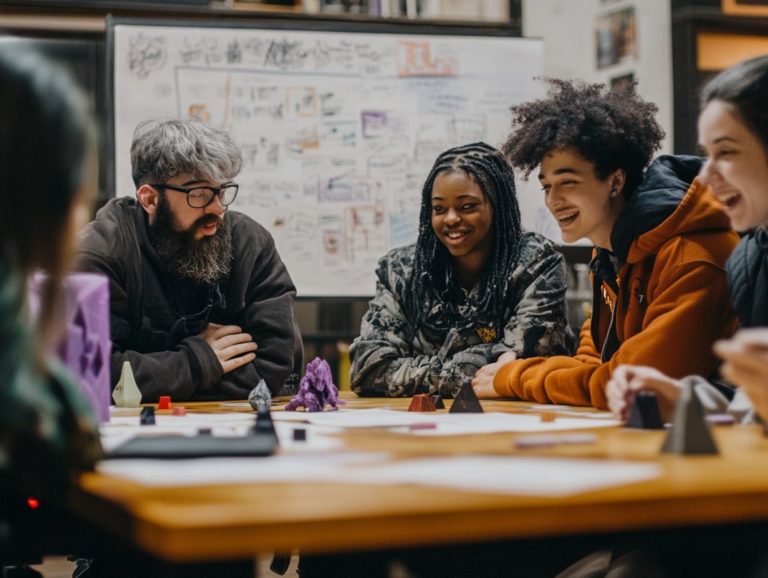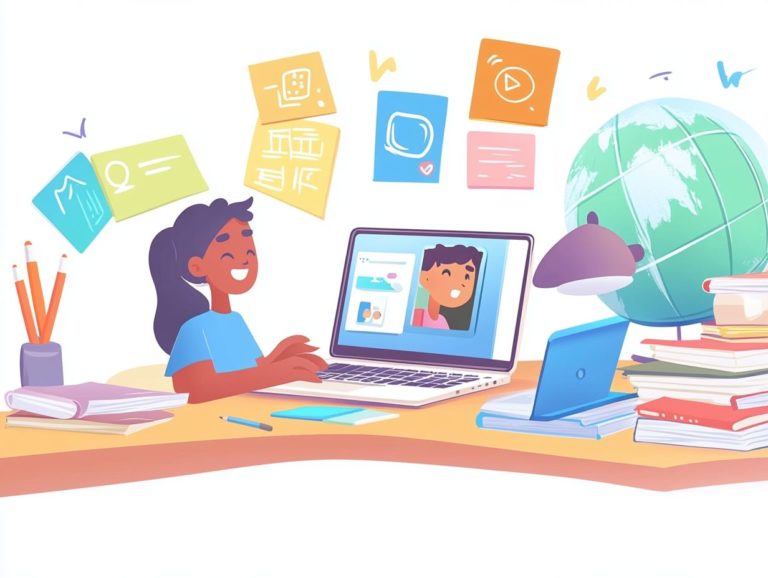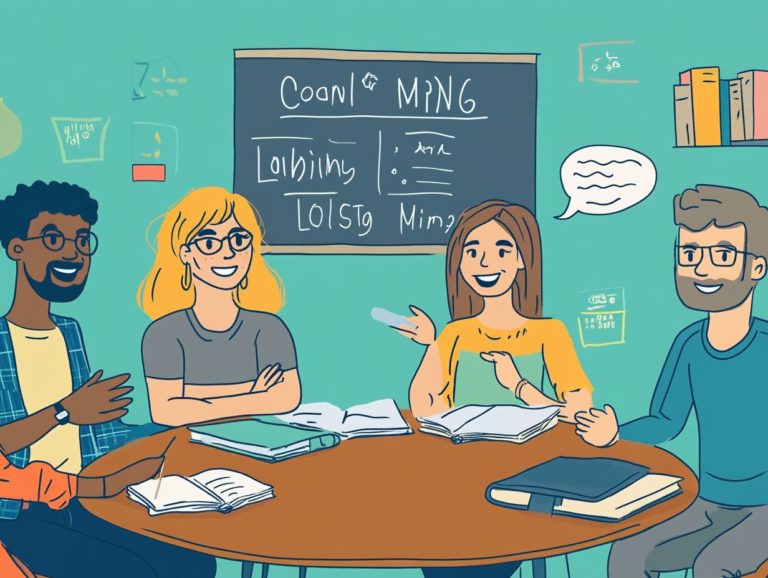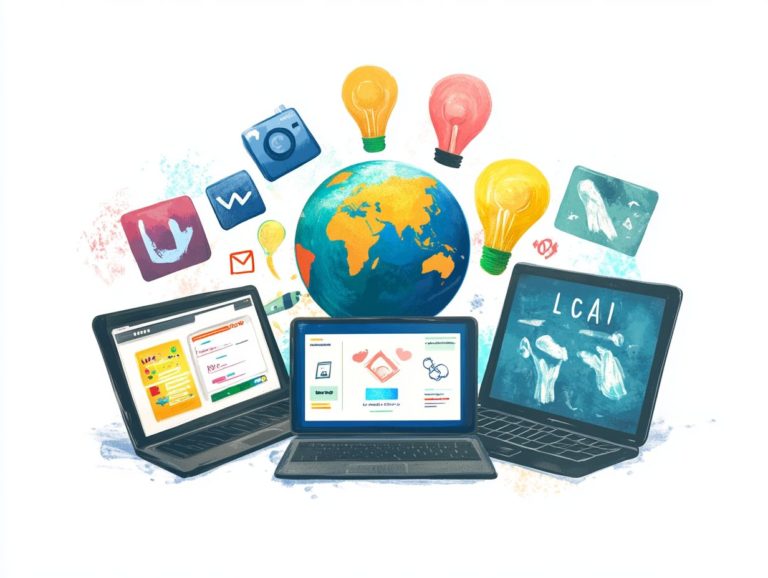5 Inspiring Language Learning Success Stories
Learning a new language transcends mere vocabulary and grammar; it opens the door to a world brimming with opportunities.
Imagine enhancing your career prospects, enriching your personal relationships, and deepening your appreciation for diverse cultures the advantages are both abundant and multifaceted!
You ll discover how bilingualism can shatter barriers, foster understanding, and even elevate your mental well-being.
You will receive practical tips to help you start your language journey and sustain your skills with ease.
Get ready to be inspired as you explore success stories and insights that could transform your approach to language learning!
Contents
- Key Takeaways:
- 1. How Learning a New Language Can Open Up Opportunities
- 2. The Benefits of Being Bilingual
- 3. Overcoming Language Barriers in Personal Relationships
- 4. Learning a Language for Cultural Understanding
- 5. Breaking Stereotypes through Language Learning
- How Can One Get Started with Learning a New Language?
- What Are the Best Ways to Practice and Improve Language Skills?
- How Can Learning a New Language Benefit Mental Health?
- What Are the Challenges of Learning a New Language and How to Overcome Them?
- How Can Learning a New Language Be Applied in Different Career Paths?
- What Are Some Tips for Maintaining Language Fluency?
- Frequently Asked Questions
- 1. What are some inspiring language learning success stories?
- 2. How can these success stories motivate language learners?
- 3. Are there any common themes among these success stories?
- 4. How long did it take for these individuals to achieve fluency?
- 5. Can these success stories apply to any language?
- 6. How can I incorporate these success stories into my own language learning journey?
Key Takeaways:

- Unlock new doors by learning a new language!
- Being bilingual has numerous benefits such as improved cognitive function, communication skills, and cultural understanding.
- Language barriers can be overcome in personal relationships through the effort of learning and understanding each other’s languages.
1. How Learning a New Language Can Open Up Opportunities
Learning a new language can truly broaden your horizons, unlocking a wealth of opportunities in both your personal and professional life. It enhances your communication skills and allows for deeper cultural immersion.
The benefits are incredibly profound! As someone who speaks multiple languages, you ll find that achieving fluency can open doors to travel, career advancements, and enriching personal relationships.
Many successful language learners share stories that reveal how the journey of language acquisition can lead to unexpected rewards. For those looking to enhance their experience, exploring 5 must-have resources for language learning success can help them overcome the challenges that come with language barriers.
You might also discover that mastering a new language boosts your cognitive abilities, which are related to thinking and understanding. This sharpens your problem-solving skills and creativity.
In the professional sphere, being bilingual can significantly enhance your job prospects and elevate your salary, especially in fields like international business or diplomacy.
As a traveler, connecting meaningfully with locals can transform a simple trip into a life-changing adventure filled with authentic experiences!
Testimonials from fellow learners often highlight how forming friendships across cultures leads to profound insights and lasting connections, ultimately fostering a more inclusive worldview.
2. The Benefits of Being Bilingual
Being bilingual offers you a wealth of advantages! It enhances your cognitive functions, boosts your job prospects, and deepens your cultural connections.
The ability to communicate in multiple languages not only enriches your personal experiences but also elevates your confidence in navigating diverse environments.
Many successful language learners stress the significance of effective techniques, such as immersive experiences and engaging content, to maximize the benefits of being bilingual.
Cognitive scientists have discovered that bilingual individuals often demonstrate superior problem-solving skills and exceptional multitasking abilities. This is all thanks to the mental flexibility required to switch between languages.
Socially, you ll enjoy richer interactions and relationships across cultures, leading to a broader worldview!
In today s professional landscape, bilingual capabilities are increasingly valued, making you a more attractive candidate to potential employers.
Innovative study methods think language exchange meetups and dynamic language learning apps provide you with flexible options to enhance your skills.
Those who speak multiple languages often share how their abilities have opened doors to exciting career opportunities and enriched their travels, showcasing the profound personal and professional growth that bilingualism can offer.
3. Overcoming Language Barriers in Personal Relationships
Overcoming language barriers is crucial for building and maintaining meaningful personal relationships. It allows for deeper connections and a mutual understanding that enriches interactions. Many language learners share compelling stories about how they navigated communication challenges and forged strong connections with others.
Consider one person’s experience that underscores the importance of patience and empathy when engaging with friends from different linguistic backgrounds. As they practiced conversations, they discovered that the more effort they invested in understanding and speaking the new language, the more their friendships flourished.
Testimonials reveal that such efforts can genuinely transform interactions, leading to emotional exchanges brimming with authenticity. With each small breakthrough, you’ll likely feel an exciting surge of belonging and appreciation. This only further proves that when communication flows smoothly, relationships can blossom in unexpectedly beautiful ways.
4. Learning a Language for Cultural Understanding

Learning a language is more than just learning words and rules; it serves as a gateway to profound cultural understanding and appreciation. When you engage with a language, you immerse yourself in the small cultural details, traditions, and values of its speakers.
By leveraging educational resources and immersive experiences, you can deepen your knowledge of diverse cultures while navigating the challenges that come with this enriching journey. Interacting with native speakers and tapping into movies, music, and books gives you insights into the social contexts that shape communication styles.
These experiences not only enhance your awareness of different perspectives but also cultivate empathy and a meaningful connection to the cultural heritage of others. Participating in language exchange programs or traveling to countries where the language is spoken offers firsthand experiences that reinforce your linguistic skills and cultural appreciation.
This journey enriches your personal growth and enhances your understanding of the world around you. Start your language journey today and see how it transforms your world!
5. Breaking Stereotypes through Language Learning
Language learning acts as a powerful catalyst for dismantling stereotypes and nurturing empathy among individuals from diverse backgrounds. As you embark on this journey, you will find that dedicated language learners often share how their commitment has challenged preconceived notions, leading to richer interactions and an expanded worldview.
Take, for example, a young traveler who immersed herself in Spanish. Engaging with locals not only enhanced her adventures but also shattered various myths about cultural differences. Through simple conversations, she uncovered shared values and interests that transcended language barriers.
Similarly, consider a businessman who devoted time to mastering Mandarin. His experience during negotiations with partners was nothing short of transformative. By making an effort to understand their language, he opened doors to deeper connections and built trust.
These stories vividly illustrate how language proficiency can foster a genuine appreciation for different cultures, paving the way for more harmonious interactions in our increasingly globalized world.
How Can One Get Started with Learning a New Language?
Embarking on the journey of learning a new language can be thrilling and intimidating. With the right approach and resources, you can achieve your language goals.
Whether you choose to enroll in a good language school or explore innovative study methods like audio lessons, tailoring your experience to suit your needs is entirely possible. Immersive techniques, such as participating in a study abroad program, can improve your language skills and understanding of different cultures.
It s essential for you to set achievable goals that align with your personal schedule and lifestyle. This will help maintain your motivation and prevent feelings of overwhelm.
Find content you enjoy, like music, movies, or podcasts in your target language. This makes learning fun.
Language exchange apps help you connect with native speakers, enabling practical conversational practice. By blending structured learning with dynamic resources, you can cultivate a more enriching and effective language journey, paving the way for lasting fluency.
What Are the Best Ways to Practice and Improve Language Skills?
Practicing your language skills requires effective strategies and commitment. By immersing yourself in techniques that provide real-world context and leveraging audio lessons for pronunciation and comprehension, you can significantly elevate your fluency journey.
Embracing diverse methods allows you to cultivate a comprehensive approach to language practice. Engaging in conversations with native speakers can dramatically enhance your speaking and listening abilities.
Utilizing language exchange apps and community groups lets you practice in a supportive environment, fostering growth and confidence. Reading books, articles, or even social media posts in your target language can further enrich your vocabulary and comprehension.
Technology offers a wealth of resources, including language learning apps and online classes, making it easier than ever to practice writing. By integrating these various methods into your routine, you can build both confidence and proficiency.
How Can Learning a New Language Benefit Mental Health?

Learning a new language can greatly boost your mental health! Engaging with a new language stimulates your brain, enhancing your memory and problem-solving skills while also improving your communication abilities. This allows you to forge deeper social connections.
Research shows that this journey sharpens your cognitive abilities and provides an emotional outlet. It helps you express yourself in fresh and exciting ways. Many learners report a surge in feelings of accomplishment and resilience, much like Maria, a bilingual enthusiast who remarked, “Each new word I master brings a sense of achievement that uplifts my mood.”
The challenge of acquiring a new language fosters adaptability, giving you the power to navigate stress with greater ease.
Such experiences underscore the deep bond between language learning and emotional health, creating a positive feedback loop that enriches your overall quality of life.
What Are the Challenges of Learning a New Language and How to Overcome Them?
Learning a new language presents its own set of challenges think mastering grammar, expanding your vocabulary, and tackling that pesky fear of making mistakes. You may encounter moments of frustration along the way, but with dedication and some creativity, these challenges can become stepping stones toward fluency.
By employing effective fluency tips and embracing a growth mindset, you will navigate the hurdles of language acquisition with confidence.
Common obstacles include the lack of practice opportunities. You may also find the sheer volume of new vocabulary to absorb overwhelming. By seeking out language partners or joining language exchange programs, you can immerse yourself in real conversational settings that make learning enjoyable and practical.
Setting small, achievable goals can be a game-changer. This approach helps you maintain motivation while providing a satisfying sense of accomplishment. Making mistakes is not just okay; it s essential. Each error presents a unique learning opportunity, paving your path to improvement.
By adopting this positive outlook, you can cultivate resilience and deepen your engagement with your language journey.
How Can Learning a New Language Be Applied in Different Career Paths?
The ability to speak multiple languages can truly transform your career, enhancing your communication skills and unlocking a wealth of international opportunities. Many successful language learners have shared how their language skills have given them a distinct competitive advantage in fields like business, healthcare, and education. By embracing language learning, you can significantly enrich your professional journey.
Take, for example, a marketing manager at a global firm who noted that her proficiency in Spanish allowed her to negotiate deals with clients across Latin America, leading to a substantial increase in sales. Similarly, a healthcare professional highlighted how being bilingual enabled him to connect with patients from diverse backgrounds, fostering trust and enhancing patient care.
These stories illustrate that the advantages of language skills go far beyond personal growth; they are essential for navigating challenges and building meaningful relationships in our increasingly interconnected world.
What Are Some Tips for Maintaining Language Fluency?
Maintaining language fluency demands your continuous practice and engagement, even after you ve achieved proficiency. By regularly weaving your language skills into daily life with innovative study methods and comprehension input, you can reinforce your learning and guard against forgetting a language. Successful language learners often share practical tips and tricks to keep their skills sharp, ensuring lasting fluency.
One effective strategy is to establish a daily practice routine that includes activities like reading books, listening to podcasts, or watching films in your target language. Joining a language exchange group, whether online or in person, opens the door to meaningful conversations and cultural insights that enrich your learning experience.
Immersing yourself in the culture like cooking traditional recipes or attending local events provides context that makes the language more relatable and enjoyable. Continuous exploration of nuances, expressions that don t mean exactly what they say, and evolving trends in the language can spark your motivation and deepen your connection with the linguistic community.
Frequently Asked Questions
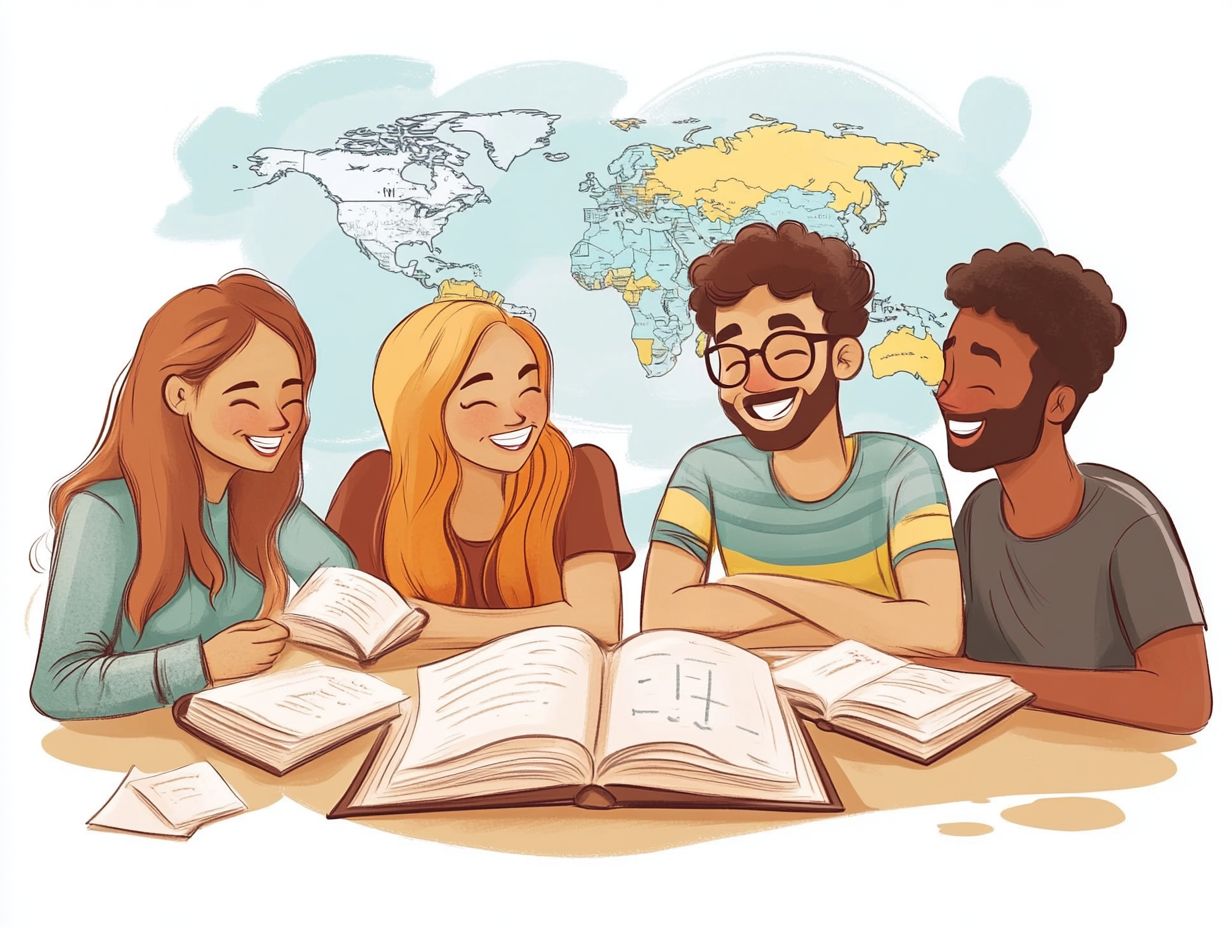
1. What are some inspiring language learning success stories?
From soap operas to video games, countless learners have found unique ways to master a new language. Examples include a woman who learned Italian by watching soap operas, a man who learned Spanish by playing video games, a family who learned Mandarin by immersing themselves in a foreign country, a student who learned French by singing along to popular songs, and a businesswoman who learned Japanese for career advancement.
2. How can these success stories motivate language learners?
Success stories can inspire language learners by showing that there isn’t a single method to learn a language, as illustrated in 5 inspiring stories of cultural adjustment success.
Each individual found a creative way that worked for them. This helps learners feel confident in discovering their own style.
3. Are there any common themes among these success stories?
Many success stories share common themes.
These include discovering fun ways to learn, immersing in the language, and having a clear motivation.
4. How long did it take for these individuals to achieve fluency?
The time to achieve fluency varied based on methods and dedication.
However, everyone reached high proficiency within a few months to a couple of years.
5. Can these success stories apply to any language?
Yes! These success stories can be applied to any language.
The key is to find an enjoyable and effective learning method that suits you.
6. How can I incorporate these success stories into my own language learning journey?
Be open to trying new methods and stay consistent in your learning.
Find practical reasons for learning, and let these stories motivate you whenever you feel stuck.

